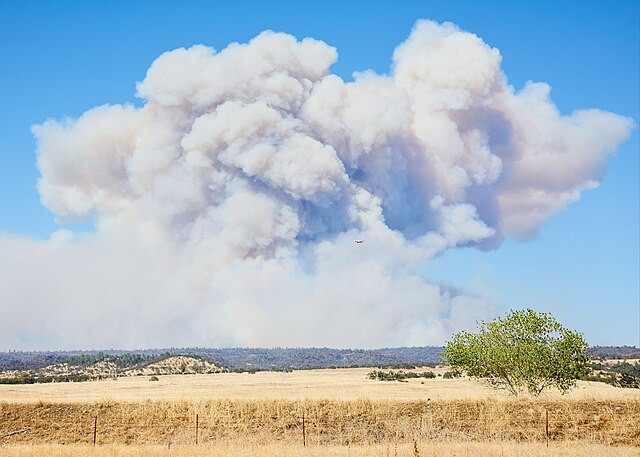California's Park Fire, the largest active wildfire in the state, has exploded in size, now ranking as one of the largest in California's history. As firefighters scramble to contain the blaze, the fire has forced evacuations across four counties, threatening thousands of homes and causing widespread destruction.
The Park Fire, which began on Wednesday, rapidly grew amid bone-dry conditions, prompting comparisons to the devastating Camp Fire of 2018 that killed 85 people and destroyed 11,000 homes in nearby Paradise. As of Saturday morning, the fire had burned over 307,000 acres, making it the eighth largest wildfire in California's history. The fire's rapid spread has been fueled by steep terrain and strong winds, according to CAL Fire officials.
More than 130 structures have already been destroyed, with thousands more at risk. Evacuations have been ordered in Butte, Plumas, Tehama, and Shasta counties, affecting over 4,400 people across 50 community zones. The fire continues to advance north and east, moving towards Lassen Volcanic National Park and threatening the small community of Mineral.
Billy See, the incident commander for Cal Fire, highlighted the fire's rapid progression, stating, "There's a tremendous amount of fuel out there, and it's going to continue with this rapid pace." On Friday afternoon, the fire was advancing at a rate of up to eight square miles per hour.
The fire's origins are tied to an act of arson. Investigators reported that a man pushed a burning car into a gully in Chico, sparking the blaze. The suspect, Ronnie Dean Stout, 42, was arrested and is being held without bail pending arraignment.
In addition to California, other parts of the U.S. West and Canada are also under siege from wildfires. In eastern Oregon, a pilot was found dead after a small air tanker crashed while fighting one of the many fires. In Idaho, lightning-sparked wildfires forced multiple communities to evacuate. The National Interagency Fire Center reported that over 110 active fires are burning across 2,800 square miles in the U.S.
The fire's impact on local communities has been profound. Carli Parker, a resident of Forest Ranch, described her family's hasty evacuation as the fire burned across the street from her home. "I think I felt like I was in danger because the police had come to our house because we had signed up for early evacuation warnings, and they were running to their vehicle after telling us that we need to self-evacuate and they wouldn't come back," Parker said.
Sherry Alpers, another evacuee from Forest Ranch, fled with her 12 small dogs and chose to stay in her car outside a Red Cross shelter in Chico, as animals were not allowed inside. Alpers expressed a sense of resignation about her home, stating, "I'm kind of worried, but not that much. If it's gone, it's gone."
Brian Bowles, also staying in his car outside the shelter with his dog, Diamon, faced a tough decision about how to use a $100 gift card he received from United Way. "Now the question is, do I get a motel room and get comfortable for one night? Or do I put gas in the car and sleep in here?" Bowles pondered.
Fire crews have made progress on other fires in the region, such as the Gold Complex fires in the Plumas National Forest near the California-Nevada line. However, resources are being stretched thin as crews are redirected to tackle the rapidly spreading Park Fire.
In response to the crisis, California Governor Gavin Newsom has declared a state of emergency, allowing for additional state resources to be deployed to fight the fire. Nearly 2,500 firefighters are currently dedicated to combating the blaze.
Weather conditions are providing a temporary reprieve for firefighters. Cooler ocean breezes have pushed inland, lowering temperatures into the upper 80s and low 90s and increasing humidity. This shift has helped firefighters make some headway, but hotter weather and potentially triple-digit heat are expected to return later in the week.
The National Interagency Fire Center reported that more than 27,000 fires have burned over 5,800 square miles in the U.S. this year. In Canada, more than 8,000 square miles have been consumed by over 3,700 fires, highlighting the widespread and severe nature of this year's wildfire season.




